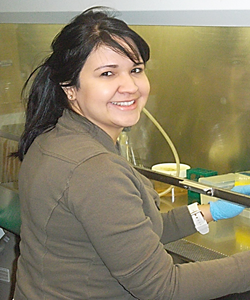
Karinna Almodovar, Ph.D.
Department: Pathology, 2014
Faculty Mentor: Jeff Davidson, Ph.D.
Current Position: Clinical Data Analyst, Sarah Cannon Research Institute
Dissertation Title: Ankrd1, a Modulator of Matrix Metabolism and Cell-Matrix Interactions
Dissertation Abstract: Normal tissue repair involves a series of highly coordinated events that include inflammation, granulation tissue formation, revascularization, and tissue remodeling. The transcriptional co-factor, ankyrin repeat domain protein 1 (Ankrd1), is rapidly and highly up regulated by wounding and tissue injury in mouse skin. Ankrd1 is also strongly elevated in human wounds. Overexpression of Ankrd1 in wounds by adenoviral gene transfer enhances wound healing. Ankrd1 has dual roles: a transcriptional co-regulator of several genes and a structural component of the sarcomere, where it forms a multi-component complex with the giant elastic protein, titin. Deletion of Ankrd1 results in a wound healing phenotype characterized by impaired wound closure and reduced granulation tissue thickness. In vitro studies confirmed the importance of Ankrd1 for proper cell-matrix interaction. We identified two Ankrd1-target genes, Collagenase-3 (MMP-13) and Stromelysin-2 (MMP-10). Both, MMP-13 and MMP-10 are important players in matrix turnover during physiological and pathological events. In summary, Ankrd1 regulates genes involve in remodeling of the extracellular matrix and is essential for proper interaction with the extracellular matrix in vitro.